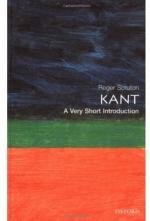
|
| Name: _________________________ | Period: ___________________ |
This test consists of 15 multiple choice questions and 5 short answer questions.
Multiple Choice Questions
1. In which groups did "Critique of Pure Reason" cause a stir?
(a) African philosophical circles.
(b) Asian philosophical circles.
(c) American philosophical circles.
(d) European philosophical circles.
2. What type of religious arguments was Kant most interested in?
(a) Arguments against God's existence.
(b) Arguments for church's relevance.
(c) Arguments given for God's existence.
(d) Arguments against church's relevance.
3. What is the problem with Descartes' certain knowledge?
(a) It assumes the existence of a self.
(b) It assumes that breathing warrants thinking.
(c) It assumes that humans think.
(d) It assumes that existence warrants thinking.
4. When Kant attempted to use the unity of apperception to prove facts about the world, who admitted that these arguments were not generally philosophically sound?
(a) Descartes.
(b) Hume.
(c) Scruton.
(d) Kant.
5. What was a result of "Critique of Reason" being difficult to read?
(a) Kant became angry and insulted his readers.
(b) Kant had another philosopher translate it.
(c) Kant released a supplemental work.
(d) Kant translated and re-released his work.
6. According to Kant's reply to religious arguments, what is not a predicate?
(a) Perfection.
(b) Self.
(c) Existence.
(d) God.
7. What type of truth is "Fido has brown spots"?
(a) A posteriori.
(b) A priori.
(c) Analytic.
(d) Synthetic.
8. What did Kant study throughout his early academic career?
(a) Philosophy.
(b) Geography.
(c) A variety of disciplines.
(d) Math.
9. For Kant to have had any possibility of objective knowledge, what must have been true?
(a) Phenomena and properties must have been casually related.
(b) Phenomena and substance must have been casually related.
(c) Phenomena and noumena must have been casually related.
(d) Phenomena and noumena must have been closely related.
10. What did Kant compare the knowledge of a soul to?
(a) Substance.
(b) Property.
(c) Phenomena.
(d) Noumena.
11. What philosophical school did Leibniz belong to?
(a) Extremists.
(b) Noumenalists.
(c) Syntheticists.
(d) Rationalists.
12. Which of the following is true about Kant's time in school?
(a) He hated learning, but his teachers encouraged him.
(b) He hated his time in school.
(c) He enjoyed spending time with his peers.
(d) He enjoyed talking to the teachers.
13. What type of perception does 'apperception' refer to?
(a) Perception of a substance.
(b) Perception of the self.
(c) Perception of a group of people.
(d) Perception of a property.
14. What are physic-theological arguments?
(a) Ontological arguments.
(b) Arguments from design.
(c) Cosmological arguments.
(d) Arguments against the existence of God.
15. What did Kant's subjective argument concern?
(a) Explaining the faculties of understanding the self.
(b) Proving that the self is a property.
(c) Explaining the proof that the self exists.
(d) Proving that the self is a substance.
Short Answer Questions
1. What question did Kant's subjective argument begin with?
2. What is described as something which exists dependently upon a substance?
3. What is described by something whose existence is not dependent upon anything else?
4. When did Kant publish "Prolegomena to any Future metaphysic which shall lay Claim to being a Science"?
5. What is theology?
|
This section contains 482 words (approx. 2 pages at 300 words per page) |

|




